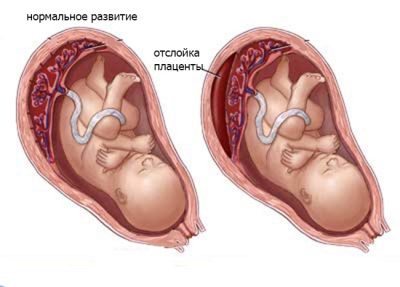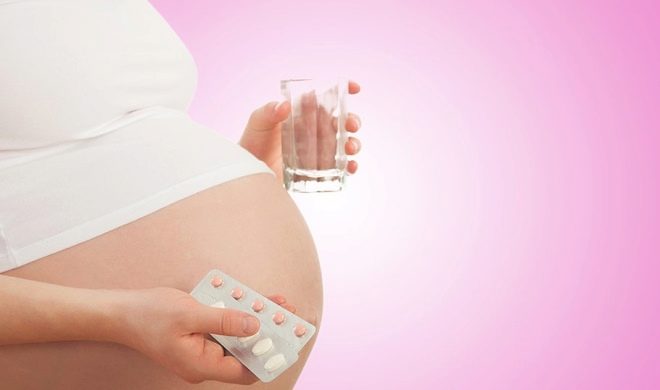What to do if you are bleeding from the nose during pregnancy?
Pregnant women are very vulnerable and suspicious. Concerns about their own health and the condition of the unborn child are quite understandable and natural. But if a woman treats nausea in the morning, back pain and changes in taste preferences, the nosebleed can cause confusion and fear in the expectant mother, especially if it is repeated with enviable regularity. To understand what to do if you are bleeding from the nose during pregnancy, you need to know the causes of this phenomenon.
What is it?
The mucous membrane of the nasal cavity is rich in blood vessels. In case of violation of their integrity under the influence of external or internal factors, nasal bleeding may develop. In medicine, this term has its own name - "Epistaxi". Most often, the blood leaves the nasal cavity through the anterior wall (flowing from the nostrils). Sometimes the bleeding passes on the back wall, therefore it drains into the esophagus, enters the stomach and can cause vomiting in bloody masses. It is extremely rare for blood to go out through the eyes, like tears, rising through the nasolacrimal canal.
The integrity of the vessels in the nasal mucosa can be broken due to mechanical injury and spontaneously. In pregnant women, spontaneous bleeding occurs more often. According to statistics, about 30% of all expectant mothers complain of nasal bleeding, appearing from time to time, in early pregnancy. In the later periods, no more than 10-15% of women pursue such an unpleasant symptom of pregnancy.
The reasons
Nasal bleeding in pregnant women can be quite natural, physiological, or caused by certain pathological conditions. To distinguish rate from pathology, it is necessary to estimate the frequency and duration of bleeding episodes. If the bleeding is not abundant, the blood quickly coagulates, bakes, the number of episodes does not exceed once a week, there is nothing to worry about.
Physiological
The reason why the integrity of the vessels of the nasal mucosa is violated, lies in the hormonal background. Progesterone and estrogens, which are produced in large doses during pregnancy, are necessary for the safe childbearing and preservation of pregnancy, they improve the filling of blood vessels in the vessels. However, the hormones themselves can cause side effects.
Sometimes in pregnant women, under the influence of progesterone, there is emotional instability, tearfulness, moodiness, while women are prone to anxiety and panic more quickly. Sleep may be disturbed.
The vessels of the nasal mucosa are thin and vulnerable. Anyone who picks his nose at least once knows how easily they can be hurt. Under the influence of hormones, blood vessels overflow with blood, do not stand up and burst. This is how nosebleeds occur. Such episodes are not long, so the bleeding stops quickly.
Contributes to the epistaxis of the cardiovascular system of the pregnant. In the first trimester, the blood flow in the woman’s body increases. This creates a danger to the integrity of the vessels of the nasal mucosa. In the second and third trimester, when a physiological rhinitis begins in pregnant women, the nasal mucosa swells, bleeding can take on the character of blood clots in the nasal mucus. A runny nose with blood is not dangerous for women and children. After birth, he passes without a trace.
Any minor factor can provoke nosebleeds if a woman:
- blows her nose inadvertently;
- sharply straightened out of a bent position;
- bends down sharply;
- during the morning toilet inaccurately removes from the nose of the mucus dried during the night.
All this can cause epistaksis, as well as staying in the heat, in a stuffy room, where the air is too dry (it happens more often in winter when the heating devices operate). These reasons are considered physiological, not dangerous for the life and health of the mother and child. If nosebleeds are regular, consultation and examination with a general practitioner is necessary. If unpleasant episodes are rare, medical care and medication are not required:
it is enough to carry a clean handkerchief and wet wipes in your purse (in case nasal bleeding is suddenly caught).
Pathological
Nasal bleeding can be a sign of a painful condition, then the expectant mother needs qualified medical care. Here are some pathologies that can cause epistaxis:
Arterial hypertension
High blood pressure during pregnancy is a serious danger to the life and development of the fetus. It adversely affects the functioning of the placenta. The baby receives less nutrients, vitamins, delays the metabolism of the fetus in the mother's body. As a result, the child begins to lag behind in development. Pathology can lead to prenatal death of a child.
Such nasal bleeding is accompanied by a headache, the woman experiences bouts of nausea, she "throws" in fever, cold, sweating increases. The blood comes out under pressure, while the bleeding is quite strong and abundant. Stop it is quite difficult. Some time after it, the nodule from the nodule and small blood clots continues.
The condition requires early hospitalization pregnant. In a hospital setting, an obstetrician-gynecologist and a therapist jointly provide the correct therapy aimed at reducing pressure. Hospital is desirable at any time, faced with such a problem.
In the third trimester (at 37-38 weeks), the doctor may decide on early delivery by cesarean section.
Impaired blood properties
Usually, in a normal pregnancy, the blood of a woman becomes more viscous, and its clotting increases. However, some congenital or acquired causes can lead to the reverse process: the blood becomes fluid, clotting is insufficient. Nosebleeds in this case are frequent. They are long in time, even if the volume of released blood is small.
Coagulability disorders are dangerous for a woman and her baby. Severe bleeding may occur in the birth process. Especially dangerous is insufficient coagulation of blood in the third trimester. It can provoke placental abruption, excessive internal bleeding, death of the fetus and mother.
The causes of low coagulation are hidden in lowered immunity under the influence of hormones. A strong weakening of the immune system reduces the ability of the blood to clot. This may be a lack of food, due to which the pregnant woman is deficient in vitamins, iron, calcium, magnesium. Sometimes the cause is innate. This is hemophilia, the carrier of which can only be a woman, and only boys are ill.
In addition to nasal bleeding, a bleeding disorder may say:
- the appearance of spontaneous bruises from any, even a slight touch;
- bleeding gums;
- blood in the urine.
In this case it is important for a pregnant woman:
- consult with a hematologist;
- special analysis - coagulograms;
- treatment prescription.
Therapy is carried out with the use of drugs that are designed to increase blood clotting, platelet count and proteins in the blood.The specialist prescribes a diet that includes products that make blood thicker (fatty meat, butter, beans, peas, cream).
Calcium deficiency
The need of a pregnant woman for calcium increases many times: from maternal blood this essential mineral goes to the babyfor which it is necessary for laying and growth of bones, cartilage, rudiments of milk teeth. The child takes the maximum amount of calcium from the mother's body, while the mother herself often suffers from hypocalcemia. This condition is easily suspected due to regular bleeding from the nose in the morning, markedly deteriorated condition of the nails, teeth and hair of the future mother. Sometimes (for example, at night) a woman may experience severe calf cramps.
The situation does not go away by itself, she needs treatment. After performing a blood test to determine the level of calcium in it, the doctor prescribes appropriate preparations for the pregnant woman and special vitamin complexes created for pregnant women. In severe cases, women can be hospitalized and treated under the supervision of doctors. The most dangerous hypocalcemia in the first trimester of pregnancy, when there is an intensive laying of the bone tissue of the baby.
Nose injuries
Nobody is insured against injuries. Any injury to the nasal septum, nasal mucous membranes, if the bleeding is difficult to stop, you should definitely show a trauma doctor. It is possible that the woman will be sent to another specialist (otolaryngologist) for the purpose of post-traumatic treatment.
Infectious diseases
Infectious diseases pose a serious danger to the child (especially in the first trimester of pregnancy). The cause of bleeding from the nose of a pregnant woman can be infectious diseases (from ARVI to herpes infection). Often, the vessels of the nasal mucosa are filled with blood due to changes in hormonal levels, and prolonged high temperature makes them brittle and fragile.
Additional danger creates self-treatment of the future mother. Uncontrolled medication (especially antibiotics), inhalations that are improperly administered at home can lead to nosebleeds, which is fraught with serious complications for the woman and the fetus.
If you can not be saved from an infectious disease, you should immediately contact your doctor. The specialist will prescribe a gentle treatment, taking into account the situation of the patient, in order to minimize the effect on the fetus of the infectious pathogen and drugs intended to combat it.
Diagnostics
A pregnant physician can contact the suspected pathological nasal bleeding. He will prescribe a blood test to rule out violations of her blood clotting, determine the level of a woman’s blood pressure, and if necessary give directions to a consultation ENT doctor and hematologist. Radiography of the sinuses during pregnancy is not assigned, surgery on the nasal septum is also postponed for the postpartum period.
First aid
If nasal bleeding occurs, the pregnant woman and her relatives can stop the blood on their own, subsequently deciding whether to visit the doctor. In order to provide first aid to the expectant mother, you will need:
- ice;
- clean cloth;
- cold water;
- cotton wool;
- hydrogen peroxide.
The algorithm is quite simple:
- a woman should sit down and ask to tilt her head slightly down;
- a napkin with ice wrapped in it is applied to the nose;
- open the vents, the balcony door to ensure the fastest fresh air supply in sufficient quantity;
- clothes that fit tightly to the neck and breast of the future mother, should be undone to relieve pressure.
If one nostril is bleeding, after 10 minutes of exposure to ice, it is pressed with a finger against the nasal septum for 5-7 minutes. If blood flows from both nostrils, press each of them alternately for 3-4 minutes.If the bleeding is abundant, with clots, the blood comes out under pressure, jolts, after the ice it is necessary to attach cotton wool moistened with hydrogen peroxide to the nose.
.And while the woman is holding her, her blood pressure should be measured and, if its values are high, call an ambulance.
What not?
Contrary to popular belief, you can not throw your head back. In this case, the pressure increases, the bleeding becomes stronger. So the blood can go into the body on the back wall, which will cause vomiting. Ingestion of nasal blood into the respiratory organs and stomach can be avoided if the woman is not laid in a horizontal position.
Do not blow your nose: this mechanical process prevents the formation of blood clots and blood clotting in the area of damaged blood vessels. No need to apply all of their knowledge of medicine, if the bleeding lasts more than 15 minutes. This state of affairs requires emergency medical care.rather than domestic measures. It is urgent to call an ambulance.
Prevention
To affect the hormonal background of women during pregnancy is impossible. Prevention measures can be considered as conditions that can be created for any woman:
- the air in the apartment should be sufficiently humidified, especially in the winter, when the heaters and radiators “dry” the air (the more humid it is, the less fragility of the vessels);
- you need to drink more fluid (about 1.5 liters of pure water per day);
- if there are swelling and preeclampsia, there are problems with the kidneys, then an individual fluid rate should be discussed with a doctor;
- It is not recommended to treat a rhinitis with vasoconstrictive drops during pregnancy: the mucous membrane does not need physiological edema;
- if you have a runny nose, it is better to wash the nose with saline, prepared by yourself, or with a pharmacy solution for irrigating the nasal mucosa (Aquamaris);
- blow pregnant women should be properly (alternately pinching one nostril);
- it is necessary to walk more often in the open air, it is useful for the nasal mucosa, the body, as well as for the baby who will soon be born;
- you can not breathe cigarette smoke and vapors of household chemicals.







































